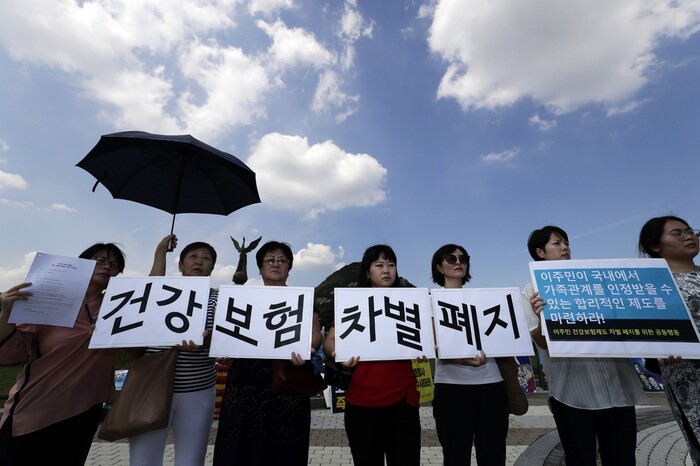hankyoreh
Links to other country sites 다른 나라 사이트 링크
[Editorial] Health insurance discrimination against foreign residents needs to be re-examined

The amended health insurance system for foreign residents introduced on July 16 appears already to be overwhelming foreigners staying in South Korea. The system is rife with problems, including the excessively narrow scope of household member recognition compared with South Koreans and the assessment of uniform premiums without consideration for the large number of residents working for low wages.
The key change has been the institution of mandatory local health insurance enrollment for foreign residents and South Korean residents abroad staying in South Korea for periods of six months or more. Before, discretional enrollment was allowed for stays of at least three months. Enrollment was also granted to those receiving humanitarian sojourn permits, which had not been available in the past. Given that 40% of legal foreign residents had no health insurance in the past due to the relatively low percentage working in environments where workplace enrollment was available, this could be seen as a well-intentioned attempt to get rid of a blind spot.
The problem is that for foreign residents – as opposed to South Korean ones – health insurance benefits have been restricted only to the subscriber, his/her spouse, and any underage children. Due to difficulties in gauging income and asset levels, premiums have been assigned across the board at the monthly average for all subscribers, which amounts to 113,050 won (US$93.17) this year.
This means that foreign workers making the minimum wage are now facing premiums in the hundreds of thousands of won. At a press conference held by human rights and migrant groups on Aug. 26, the example was shared of a 20-year-old Kareisky (ethnic Korean from the former Soviet Union) and Uzbek national living with a sick mother and elderly grandmother who received three bills of over 110,000 won (US$90.59) apiece. With the government announcing plans to limit sojourn periods for those in arrears, the amended health insurance system is being taken by foreign residents as a threat to their sojourn status.
The truly shocking thing is that this system was introduced without a single survey of average income levels or housing conditions for those affected. While we can understand the government’s desire to reduce the amount of improper usage and contribute to great health insurance security, it is tough to argue with critics who claim that introducing a system applying across-the-board premiums to foreign residents without any investigation of the reality constitutes discrimination. If these were South Korean citizens, there would have been several simulations at the very least. The groups accused the new system of “collecting more money from easy foreign targets in order to reduce the health insurance deficit.”
At a time when we have our hands full establishing new perceptions and institutions for an era of 3 million foreign residents in South Korea, it makes no sense for the government to adopt policies of discrimination and exclusion. We look forward to seeing the administration conduct an investigation of the situation and taking action at once to provide a minimum safety net for vulnerable migrants.
Please direct comments or questions to [english@hani.co.kr]

Editorial・opinion
![[Column] Welcome to the president’s pity party [Column] Welcome to the president’s pity party](https://flexible.img.hani.co.kr/flexible/normal/500/300/imgdb/original/2024/0515/3917157400447943.jpg) [Column] Welcome to the president’s pity party
[Column] Welcome to the president’s pity party![[Editorial] Korea must respond firmly to Japan’s attempt to usurp Line [Editorial] Korea must respond firmly to Japan’s attempt to usurp Line](https://flexible.img.hani.co.kr/flexible/normal/500/300/imgdb/original/2024/0514/2317156736305813.jpg) [Editorial] Korea must respond firmly to Japan’s attempt to usurp Line
[Editorial] Korea must respond firmly to Japan’s attempt to usurp Line- [Editorial] Transfers of prosecutors investigating Korea’s first lady send chilling message
- [Column] Will Seoul’s ties with Moscow really recover on their own?
- [Column] Samsung’s ‘lost decade’ and Lee Jae-yong’s mismatched chopsticks
- [Correspondent’s column] The real reason the US is worried about Chinese ‘overcapacity’
- [Editorial] Yoon’s gesture at communication only highlights his reluctance to change
- [Editorial] Perilous stakes of Trump’s rhetoric around US troop pullout from Korea
- [Guest essay] Preventing Korean Peninsula from becoming front line of new cold war
- [Column] The state is back — but is it in business?
Most viewed articles
- 1[Column] Welcome to the president’s pity party
- 2[Editorial] Korea must respond firmly to Japan’s attempt to usurp Line
- 3Korea cedes No. 1 spot in overall shipbuilding competitiveness to China
- 4Could Korea’s Naver lose control of Line to Japan?
- 5[Editorial] Transfers of prosecutors investigating Korea’s first lady send chilling message
- 6[Column] Will Seoul’s ties with Moscow really recover on their own?
- 7US has always pulled troops from Korea unilaterally — is Yoon prepared for it to happen again?
- 8Second suspect nabbed for gruesome murder of Korean in Thailand, 1 remains at large
- 9Korean auto industry on edge after US hints at ban on Chinese tech in connected cars
- 10Major personnel shuffle reassigns prosecutors leading investigations into Korea’s first lady